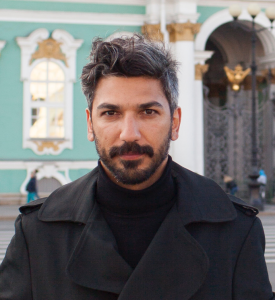George Baroud
Assistant Professor
PhD, 2015, New York University
 I received my BA from the University of Massachusetts at Amherst (2008) and my PhD from New York University, both in Classics (2015). As an undergraduate I participated in the Intercollegiate Center for Classical Studies in Rome (2005); as a graduate student I was a DAAD fellow at the Humboldt University in Berlin (2013-4). Prior to arriving to UNC, I was Assistant Professor in the Department of Writing, Literature and Publishing at Emerson College and, before that, the inaugural Postdoctoral Faculty Fellow in Social Foundations in Liberal Studies at NYU. In both roles I was tasked with designing and teaching a wide range of humanities courses from a critical and self-aware perspective. The classes I offered combined rigor in Classics with a comparative, diachronic, and global approach that paired the Greek and Roman with traditions from Africa to East Asia and beyond.
I received my BA from the University of Massachusetts at Amherst (2008) and my PhD from New York University, both in Classics (2015). As an undergraduate I participated in the Intercollegiate Center for Classical Studies in Rome (2005); as a graduate student I was a DAAD fellow at the Humboldt University in Berlin (2013-4). Prior to arriving to UNC, I was Assistant Professor in the Department of Writing, Literature and Publishing at Emerson College and, before that, the inaugural Postdoctoral Faculty Fellow in Social Foundations in Liberal Studies at NYU. In both roles I was tasked with designing and teaching a wide range of humanities courses from a critical and self-aware perspective. The classes I offered combined rigor in Classics with a comparative, diachronic, and global approach that paired the Greek and Roman with traditions from Africa to East Asia and beyond.
My research is underpinned by a profound interest in the theory and philosophy of history, and my primary scholarship focuses on Classical rhetoric and historiography in the early imperial Roman period, especially Tacitus. My monograph in progress, tentatively titled Tacitus’ Annals and the Aesthetics of History, is a study in the phenomenology of history: I combine philological analysis with ancient and contemporary theories (such as enargeia, ekprasis, ‘presence’, and ‘immersion’) to argue that in Annals, Tacitus deliberately crafts vivid, immersive historical narratives in order to evoke affective responses in his audiences. I assert that this ‘experiential’ dimension has important epistemological and political implications, and reflects a specifically Graeco-Roman understanding of historical truth. Beyond Classics, the theoretical model my monograph offers looks to the future of historiography to ask pressing questions about the rhetorical, didactic, ethical, and pragmatic functions of historical writing, for example how vivid, immersive media and technologies (from video to virtual reality to deep fakes) will impact the ways we conceptualize and practice history itself.
My publications examine diverse aspects of the history, politics, literature, and culture of the early Roman empire. I have written on Valerius Maximus’ exemplary treatment of amicitia as an exploration of the novel pressures exerted by monarchic politics on friendship (Brill); on cultural memory as a tool both for Roman senators and ‘barbaric’ Britons for resisting imperialism, colonialism, state ideology, and erasure under Domitian and Trajan (CUP, forthcoming); on reading culture and the impact of recitationes on the production and consumption of historical literature in the early imperial period (De Gruyter); and on historiography, astrology, and zoology as competing hermeneutics for interpreting mirabilia in Tacitus’ Annals 6 (Bloomsbury). This last is one step I have taken towards my next major project, which examines the epistemological and methodological relationship between philosophy, science, and history in Roman historical thought. I have contributed shorter publications to a special issue of Humanities on Roman citizenship, migration, and displacement; to the Tacitus Encyclopedia (Wiley-Blackwell); the Oxford Classical Dictionary (co-authored with Elena Isayev); and a review-discussion in Histos.
Further afield, I have strong interests in the literary and cultural interactions between Classical literature and culture and the Arabic/Islamic worlds, and have lectured on comparative ethnographies in Herodotus and Ibn Khaldun, as well as on the reception of Greek tragedy in the contemporary Arab theater. Further afield, one ongoing personal project combines my work in Classics with my work as a social documentary and travel photographer, and involves photographing classical sites in my homeland of Lebanon, a small gesture towards preserving the images of a heritage that faces a real risk of total obliteration. You can see this work here.
E-mail: gbaroudATuncDOTedu